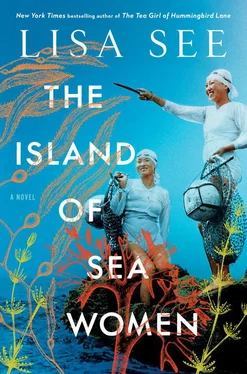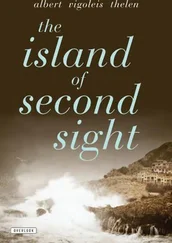Do-saeng silently wept. The story helped one suffering mother to hear of another suffering mother.
“The Japanese say if Grandmother Seolmundae existed and if that oreum was the water pathway to her underwater palace,” Shaman Kim went on, “then she abandoned us, as have all our goddesses and gods. I say she never left us.”
“We sleep on her every night,” we recited. “We wake on her every morning.”
“When you go into the sea, you dive among the underwater ripples of her skirt. She is the great volcano at the center of our island. Some people call it Mount Halla, the Peak That Pulls Down the Milky Way, or the Mountain of the Blessed Isle. To us, she is our island. Anywhere we go, we can call to her and weep out our woes, and she will listen.”
Shaman Kim now directed her attention to Yu-ri, who had not once stirred.
“We are here to help Yu-ri with her traveling-soul problem, but we must also worry about those of you who’ve suffered soul loss, which happens any time a person receives a shock,” she said. “Your collective has experienced a terrible blow. None has suffered more than Yu-ri’s mother. Do-saeng, please kneel before the altar. Anyone else who is in anguish, please join her.”
My mother knelt next to Do-saeng. Soon the rest of us were on our knees in a circle of anguish. The shaman held ritual knives in her hands from which white ribbons streamed. As she sliced through negativity, the ribbons swirled around us like swallows through the air. Her hanbok ballooned in clouds of riotous color. We chanted. We wept. Our emotions flowed from us accompanied by the cacophony of cymbals, bells, and drums played by Shaman Kim’s assistants.
“I call upon all goddesses to bring Yu-ri’s spirit back from the sea or wherever it is hiding,” Shaman Kim implored. After making this request another two times, her voice changed as Yu-ri inhabited her. “I miss my mother. I miss my father and my brother. My future husband… Aigo …” The shaman turned to my mother. “Diving Chief, you sent me here. Now bring me home.”
The way Yu-ri’s voice came out of Shaman Kim’s mouth sounded more like blame than an entreaty for help. This was not a good portent. Shaman Kim seemed to acknowledge this. “Tell me, Sun-sil, how would you like to respond?”
My mother rose. Her face looked taut as she addressed Yu-ri. “I accept responsibility that I sent you into the sea, but I gave you a single duty that day: to stay with my daughter and help the Kang sisters as they looked after Mi-ja. You were the eldest of the baby-divers. You had an obligation to them and to us. Through your actions, I could have lost my daughter.”
Perhaps only I could see how deeply affected Mother was by what had happened. I was both awed and humbled. I hoped one day I could prove to her that I loved her as much as she loved me.
Shaman Kim swiveled to Do-saeng. “What do you wish to tell your daughter?”
Do-saeng spoke sharply to Yu-ri. “You would blame another for the results of your greed? You embarrass me! Leave greed where you are and come home right now! Don’t ask someone else to help you!” Then she softened her tone. “Dear girl, come back. Your mother and brother miss you. Return home and we will drench you in love.”
Shaman Kim chanted a few more incantations. The helpers banged their cymbals and drums. After that, there was nothing left to say or do.
The next morning, Yu-ri woke up. She was not the same girl, though. She could smile, but she could not speak. She could move, but she limped and sometimes jerked her arms. Both sets of parents agreed that a marriage was no longer possible. Mi-ja and I hung on to my secret, which made us closer than ever. In the weeks that followed, after we’d worked in the dry or wet fields, we visited Yu-ri. Mi-ja and I talked and giggled, so Yu-ri would have the sense she was still a young girl with no worries. Sometimes Jun-bu joined us and read aloud the essays he was writing for school or tried to tease us as he had once teased his sister. On other days, Mi-ja and I helped Do-saeng wash Yu-ri’s body and hair. And when the weather grew warm, Mi-ja and I took her to the shore, where we sat in the shallows to let the smallest wavelets lap against her. We told stories, we patted her face, we let her know we were there, and she would reward us with a beautiful smile.
Every time I visited, Do-saeng bowed and expressed her gratitude. “If not for you, my daughter would have died,” she’d say as she poured buckwheat tea or presented me with a dish of salted smelt, but her eyes sent a darker message. She may not have known exactly what part I’d played in Yu-ri’s accident, but she certainly suspected that it was more than I’d let on, either to her or to my mother.
(before)
When Mi-ja and I first met, we were such opposites. I was like the rocks of our island—jagged, rough, all edges, but useful and no-nonsense. She was like clouds—drifting, melting, impossible to catch or fully understand. Even though we both became haenyeo, I would forever be of the earth in the sense that I was practical and concerned always for my family. Mi-ja was more like the sea—ever changing and occasionally tempestuous. I was tied closely to my mother and longed to follow her into a life in the sea; Mi-ja had no memory of her mother but missed her father terribly. I had the love and respect of my brothers and sister, while Mi-ja had only an aunt and uncle who didn’t care for her. I worked hard, hauling water, carrying my baby brother on my back, doing farmwork, and gathering dried manure for heating, but Mi-ja worked harder still, completing chores for her aunt and uncle, in our fields, and for the collective. I could not read or write my name. Mi-ja could write her name and still remembered a few Japanese characters. And, as steady as I appeared to others, inside I was often fearful; as evanescent as she seemed from the outside, her inner fortitude seemed to be as strong as bamboo—able to withstand almost any force or weight. On Jeju, we had a saying: If there is happiness at age three, it will last until you reach eighty. I believed this to be true. Mi-ja, on the other hand, often said, “I was born on a day with no sun and no moon. Did my parents know how hard my life would be?” We could not have been more different, and yet we were very close.
How do we fall in love? The first time you see your husband’s face on your engagement day, you don’t know how your emotions will evolve over time. The moment your baby is wrenched from your insides, love may not be what you feel. Love must be nurtured and tended to in the same way we haenyeo care for our fields under the sea. With arranged marriages, many wives fall in love with their husbands quickly. For some, it can take years. And for others, decades of marriage will always be filled with loneliness and sadness, because we never grow the connection to that person with whom we share our sleeping mat. As for children, every woman knows the fears and sorrows. Joy is a delicious luxury that we experience most cautiously, for tragedy conceals itself around every corner. How different it is with friendship. No one picks a friend for us; we come together by choice. We are not tied together through ceremony or the responsibility to create a son; we tie ourselves together through moments. The spark when we first meet. Laughter and tears shared. Secrets packed away to be treasured, hoarded, and protected. The wonder that someone can be so different from you and yet still understand your heart in a way no one else ever will.
I remember clearly the first day I saw Mi-ja. I had recently turned seven. I lived a happy, if simple, life. We were poor, no better or worse than our neighbors. We had our wet fields in the ocean and our dry fields on land. We also had a small home garden next to our kitchen, where Mother grew white radishes, cucumbers, sesame leaf, garlic, onions, and peppers. While the vastness of the sea would suggest endless bounty, it was an unreliable source of food. The island had no natural harbors. The seas were rough. Our Korean kings had long barred our men from fishing in any significant way, and now, under Japanese rule, fishermen were allowed only rafts, with a single seat and a sail. (Or they could work on the large Japanese fishing vessels or in their canneries.) Many Jeju men were lost to rough tides, high waves, and strong winds. Long ago, Jeju’s men had been divers, but the Korean monarchs imposed such a high tax on their work that it was eventually given to women, who were taxed at a lower rate. It turned out that women had an aptitude for the work. Women, like my mother, were patient. Women understood suffering. Women had more fat, so they were better suited to endure the cold. Still, it was hard for Mother—or any woman—to make a meal hearty enough for a large family from sea urchin roe, turban shell, sea snails, and abalone alone. Besides, those creatures were not for us. They were for the wealthy—or, at least, wealthier—people on the mainland, or in Japan, China, and the USSR. All this meant that for most of the year my family lived on the millet, cabbage, and sweet potatoes that we grew in our dry field, while the money Mother earned from diving paid for clothes, house repairs, and anything else that required cash.
Читать дальше












